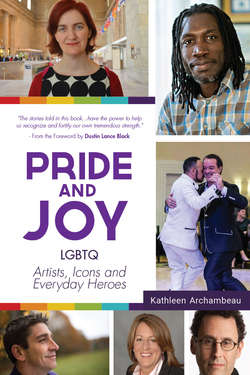Читать книгу Pride & Joy - Kathleen Archambeau - Страница 24
На сайте Литреса книга снята с продажи.
ОглавлениеTrudging across the marshy fields of Lake Charles, Louisiana, the slight adolescent was carrying a heavy wooden case that housed his cello. He slipped in the mud and his case broke open, sending the bridge, finger board and peg box flying. When he got to his father’s university office and told him the story, his father said, “You don’t really like this and I don’t think you should play anymore. I don’t want you to be part of the orchestra.” His father had taken over the Governor’s Program for Gifted Children as orchestra conductor for his very sick mother. Tony reacted, “Good. I don’t want to be in your orchestra. You’re mean.”
Tony Kushner and his father had a strained relationship when he was growing up. Tony believes his father realized he was gay as early as age two or three and he didn’t like it—he didn’t like Tony being called a sissy and didn’t like Tony’s lack of athletic ability and interest in sports. Tony was not alone in not fitting into the family dream. His older sister was born deaf in a family of professional musicians. William Kushner was a conductor and clarinetist, and Sylvia Kushner was an accomplished bassoonist. When Leslie Kushner was small, 1950s doctors blamed Tony’s mother’s professional gigs away from home for Leslie’s “psychosomatic deafness.” Doctors and psychologists insisted that mothers should not work and should stay at home. In denial, Tony’s parents did not fit Leslie with hearing aids until she was four.
So, when Tony finally came out in his early twenties, it was his brilliant painter sister whom he first told. Both she and he shared outsider status in the family. Tony’s younger brother, Eric, is a principal hornist for the Vienna Philharmonic, so carried on the family’s musical tradition.
Tony Kushner’s mother and his father were working musicians. Born in Manhattan, New York City, they harbored concerns that their professional musician status and travel schedule would be too financially and emotionally costly to raise a family. Shortly after Tony’s birth, they returned to Lake Charles, Louisiana, at the urging of Tony’s grandfather, owner of a lumber business. They soon found their way back to professional musicianship and gave Tony Kushner a blueprint for living as a working artist.
William Kushner’s two great loves were music and literature. He could quote Keats and Shakespeare by heart. So, Tony grew up hearing the words of the great literary giants in his own home.
Tony Kushner always wanted to be a working artist, though he never imagined his second play, Angels in America, would catapult him to fame and fortune. In the two-part play, Angels in America: Millennium Approaches and Angels in America: Perestroika, Kushner broke both the rules of play-making, staging a seven-hour epic over the course of two days, and the silence surrounding the AIDS epidemic in America. “In a sense, until Hamilton came along, nothing else since Angels has had that kind of impact. So most of what has happened to me as a professional writer is in one way or another traceable to Angels in America. The sweep of it would make a claim on the importance of gay people in American life. It presented the idea that what was happening in the lives of gay men and lesbians was a worthy subject for a really sprawling momentous play not only for the LGBTQ, but the American, community at large,” Kushner said.
When Angels opened, it was a huge sensation in 1990, but Tony’s mother never fully realized Kushner’s success. She died at age sixty-seven of breast cancer in that same year. Tony was just thirty-four.
Tony Kushner’s father was one of the first to read a draft of Angels in America. He called Tony and said, “I will tell you that I find some of this ugly in terms of the subject matter. I have a great deal of difficulty with it, but as writing, it’s very beautiful and I think it’s going to be a very big deal.” Oskar Eustis at the Eureka Theater in San Francisco suggested the standard 2.5 hours as a guideline for the play’s length. Eustis, now Artistic Director of the Public Theater of New York City and creative collaborator on the musical Hamilton, trusted Kushner’s instincts, however.
Those instincts proved prescient. For the play, Tony Kushner won an unprecedented 1993 Tony Award and Pulitzer Prize for Angels in America: Millennium Approaches and a 1994 Tony Award for Angels in America: Perestroika. Kushner adapted the screenplay for the 2003 HBO Special, starring Meryl Streep, Mary Louise-Parker, Emma Thompson, and Al Pacino, which launched him on his screenwriting career.
As to the life of a working artist, Kushner says that “the play (Angels) certainly was my second play and it made me fairly well-known and gave me financial security, not a lifelong financial security, but certainly several years. It paid the bills and made it possible for me to do the kind of work I wanted to do without worrying too much about how to pay the rent. It established me as a playwright.”
Mark Harris, Tony’s husband, partners for 18 years, and Tony Kushner. broadway.com
